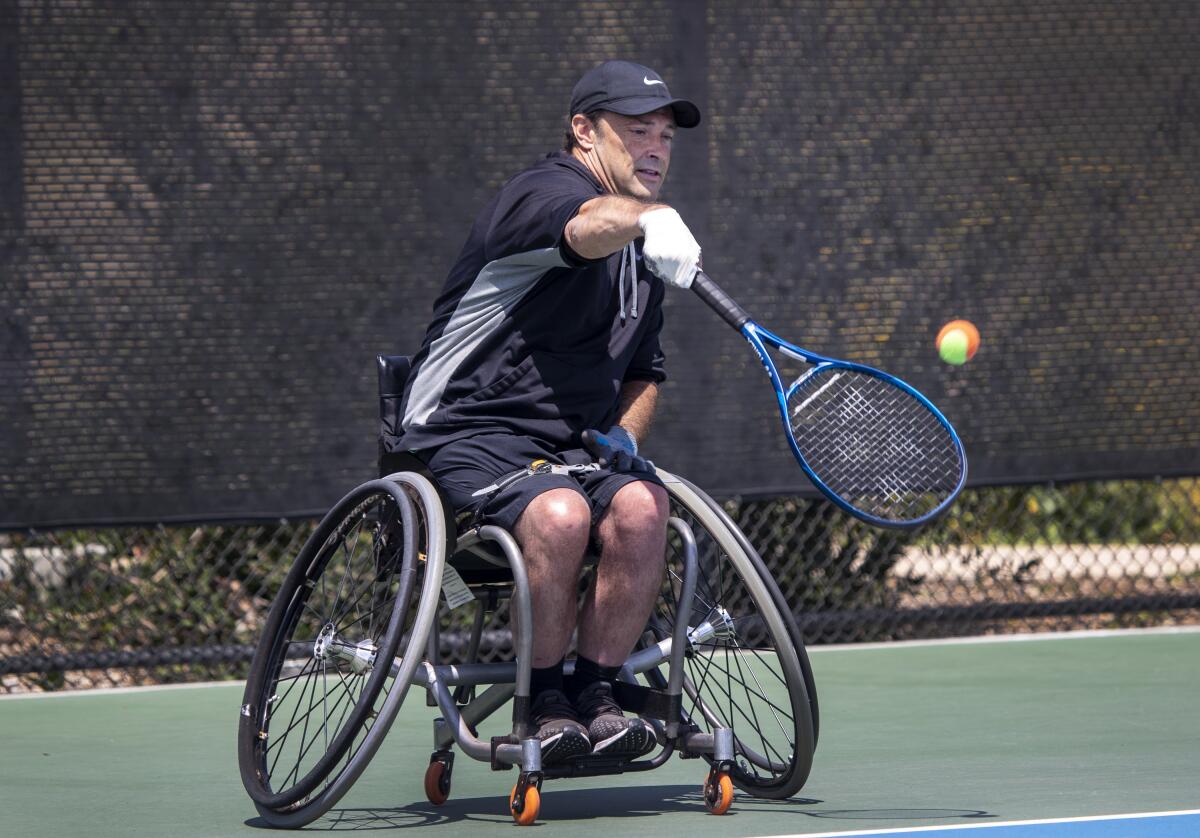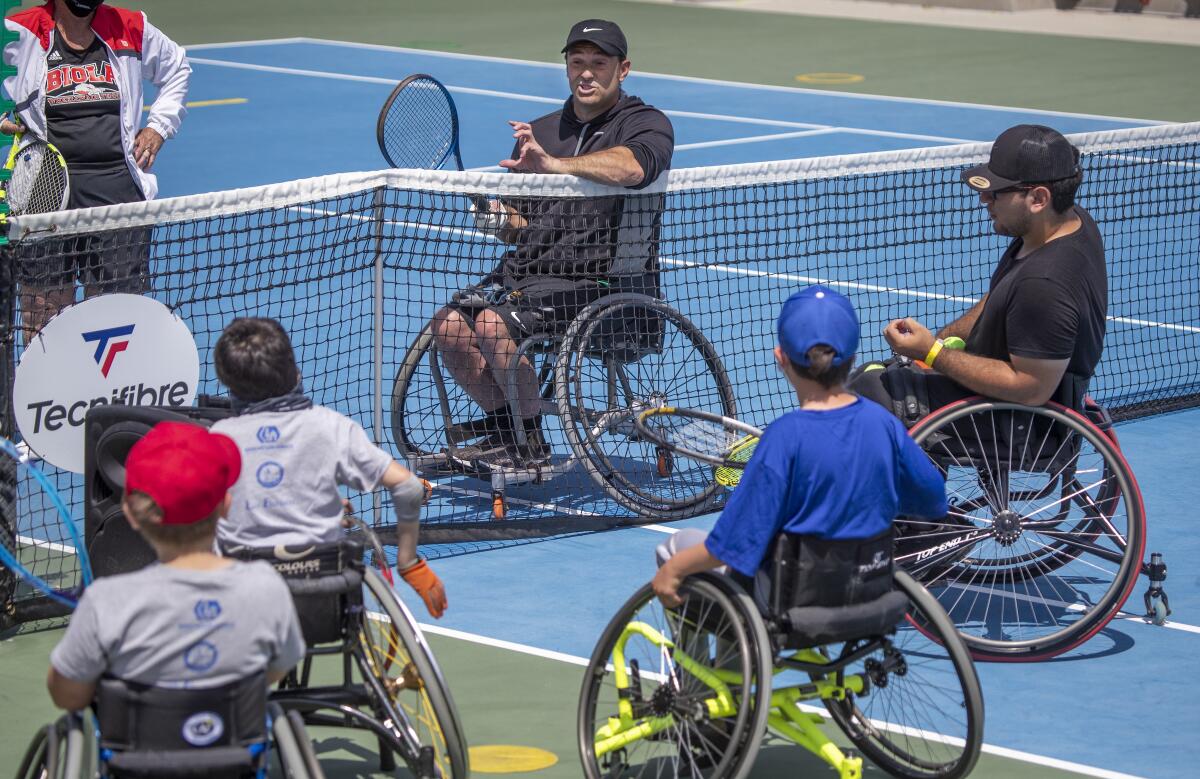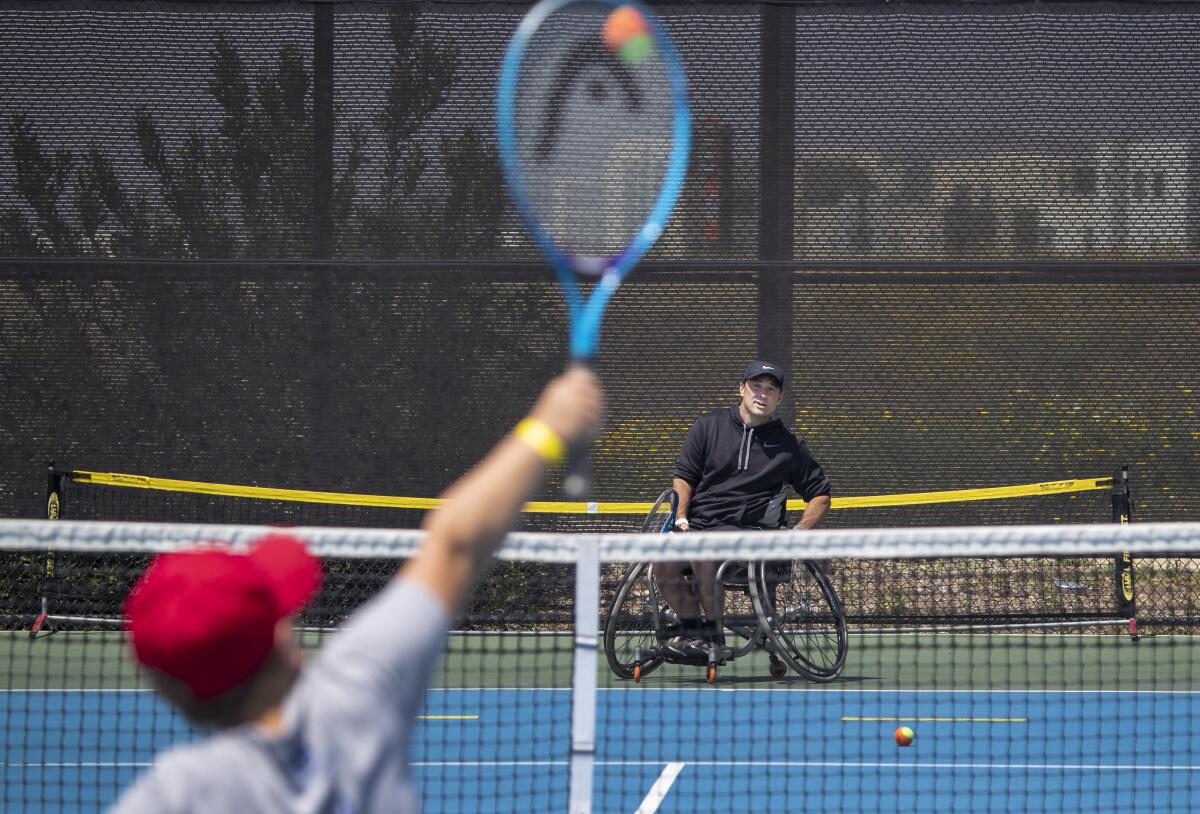Column: Wheelchair tennis changed David Wagner’s life. He hopes it can do the same for others

David Wagner is swatting soft serves over the net, but few of the kids on the other side are hitting it back. Most are still figuring out how to push their wheelchair into position to receive the ball, time their swing and make contact. Some become frustrated when their turn comes and they miss.
Sitting in his specially adapted wheelchair, his racquet bound to his right hand with white athletic tape because his spinal cord injury robbed him of the use of his core muscles, Wagner is hopeful the kids will stick with it and discover the worlds that wheelchair tennis can open for them, as it did for him. He dispenses useful tips and encouraging words as he scoots around the court at a U.S. Tennis Assn. Southern California event at Great Park in Irvine.
“Good try,” he calls out to a youngster who swings and misses. “Good rally,” he says to a kid who hit the ball back well. “Thanks for making me look good,” he tells another.
Wagner, a Fullerton native who grew up in Washington state, became a quadriplegic at 21 when he broke his neck while chasing a frisbee into a deceptive current at Redondo Beach. A natural athlete, he wanted the camaraderie of playing sports to carry over into his new life. He loved basketball, but the nature of his injury ruled out wheelchair basketball because he couldn’t easily catch or shoot the ball. “I didn’t have a huge desire to even try it, and I’m not sure really why, to be honest with you,” he said. “Maybe it just had a different feel to me.”
“We put athlete first, disability second, and these kids have an opportunity to feel that way. And that’s such a great thing.”
— David Wagner

Table tennis was the first sport he tried. Wheelchair tennis became his calling.
Wagner, 47, has won four medals in the quadriplegic singles category and four medals in quad doubles — three of them gold — in the last four Paralympic Games. He has mathematically qualified for the delayed 2020 Tokyo Paralympics, which are scheduled for Aug. 25 through Sept. 5, and he’s training full time at the Olympic training center in Chula Vista.
Wagner also was instrumental in getting quad tennis added to the U.S. Open and is a 19-time quad doubles champion and six-time quad singles winner at tennis’ Grand Slam events. Venus Williams, a winner of multiple Grand Slam tournaments, proclaimed him her friend and an inspiration in a YouTube video.
Angelique Fong of Mission Viejo is this year’s 21st Duck, an honor the NHL team gives to someone distinguished by their character, courage or community contributions.
He has become a quad tennis evangelist and educator by maintaining a high level of play — he’s ranked No. 4 in the world in quad singles — and by speaking at clinics like the one he attended in Irvine in late April at the request of the Southern California Tennis Assn. Foundation. The foundation trains coaches to teach wheelchair tennis and supplies wheelchairs for those who want to try it. Wagner provides motivation and a path forward.
“It’s not about these kids, every single one of them, making the Paralympics or winning a gold medal,” he said. “It’s about how many of them get to go play tennis with their brother, and instead of being the disabled kid who’s just keeping score, they’re the disabled child who’s playing. They’re the athlete with a disability as opposed to the disabled scorekeeper. We put athlete first, disability second, and these kids have an opportunity to feel that way. And that’s such a great thing.”
Wagner took up table tennis while undergoing rehabilitation near his home in Walla Walla, Wash. He could play when friends came to visit, reclaiming a sliver of his old life. While reading the magazine Sports ‘N Spokes, which focuses on adaptive sports, he saw an advertisement for a wheelchair tennis clinic in Beaverton, Ore., about four hours away. He was intrigued.

“For me, it was about what I could play that most similarly emulated what I was doing before, or as an athlete before, and that was tennis and table tennis,” he said. “You and I could go play table tennis for fun. For seriousness. For money. Whatever we want. You and I could go play tennis, and you don’t have to sit down and play. And that was truly what attracted me to the sport.”
He learned about wheelchair tennis from pioneers Randy Snow, Dan James and Rick Draney. He discovered he could join standing people to play doubles and that he could make competitive tennis a career. The clothing company Uniqlo sponsors a professional tour for men and women’s wheelchair competition and has a quad category. “I didn’t realize you could take it to a higher level,” Wagner said. “I thought it was just playing with your family and friends.”
Wagner’s training at the Chula Vista facility incorporates swimming, workouts in the gym, and handcycling. The pandemic-induced year’s delay of the Tokyo Paralympics and the postponement or cancellation of other events tested him mentally but helped him physically as he recovered from hernia surgery. His normally hectic schedule slowed, allowing him to fully heal.
Ten former USC Song Girls described to The Times a toxic culture within the famed collegiate dance team that included longtime former coach Lori Nelson rebuking women publicly for their eating habits, personal appearance and sex lives.
“I have missed competition immensely, and I’ve missed the camaraderie, the competition challenges,” he said. “Why do you train? You train to compete. So to not have that has been a challenge, but it has basically prolonged my career. It has given me a renewed vigor toward feeling good about the sport. Not that I didn’t feel good about the sport, but I felt I could train harder and get back into a longer training block. I had four months to just let my body feel good, and that was awesome.”
Competing in the 2028 Los Angeles Paralympics is his goal. “Maybe I’ll play with one of you guys here, grown up,” he told the kids he met in Irvine. “I love the sport. I just love trying to improve. You can always have a better forehand. You can always have a better backhand. You can always be more kind. Take that same mentality into life.”
See the athlete, not the disability. See David Wagner and become inspired.
More to Read
Go beyond the scoreboard
Get the latest on L.A.'s teams in the daily Sports Report newsletter.
You may occasionally receive promotional content from the Los Angeles Times.











